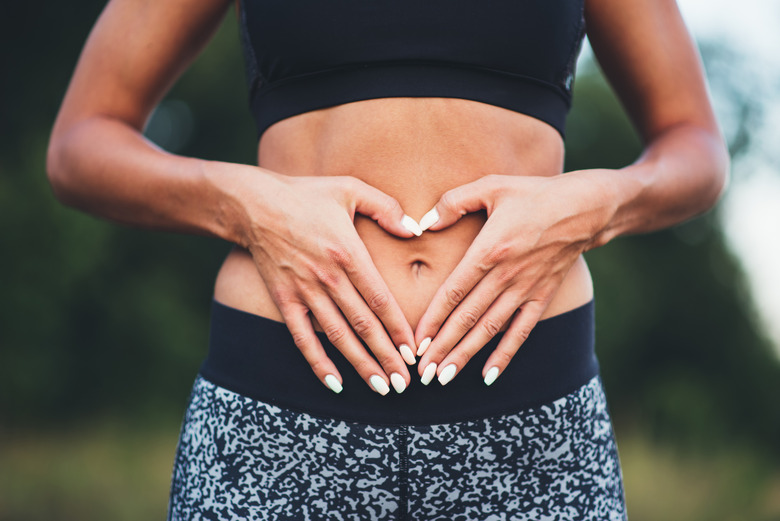At-Home Gut Health Tests Are Trending, But You Shouldn't Trust Them
You might have heard of uBiome — an innovative, at-home microbiome test. From the comfort of your home, you can analyze the bacteria in your gut to figure out how much of the "good" and how much of the "bad" is rumbling in your tummy. Theoretically, you could then diagnose yourself and pursue various dietary regimens or habits to solve your stomach's problems. The test involves mailing in a sample of your poop (yes, people actually do that) to a panel of doctors on the receiving end.
After surviving ridicule from the press and the sardonic Twittersphere, uBiome is making a break in the wellness scene — using Instagram to make the smelly, awkward test look glam.
Don't worry, it's no large brown-boxed package — a simple swab will suffice. And if anyone can make mailing poop look pretty, it's Instagram. Some clean-eating-obsessed, avocado-sculpting health influencers got crafty photographing the boxes, using careful soft lighting and athleisure styling to make poop-mailing look fab.
The posts renewed people's interest; the influencers cashed a check.
The test, called SmartGut, claims to provide an accurate and in-depth review of what's going on in your stomach — weeding out the "bad," sugar-craving bugs and teaching you to promote bacteria that's "good."
It's the "good gut, bad gut" philosophy. Good cravings, bad cravings. Flat belly, bloated belly. You can see why the trend caught on.
Recent claims from health gurus have convinced many eager listeners that their gut health could be the root of all their problems — especially their problems with their bodies.
Gut health has been blamed for everything from allergies to emotions to acne. Probiotics and yogurts claim to deliver "a healthy weight" or "weight management" by balancing bad gut bacteria. People became eager to solve their silent stomach dramas, hoping to drive out the stomach bugs that could be sabotaging their beach bod.
And when their favorite thin, yoga-practicing, clear-skinned influencers publicly enlist uBiome to solve their bloating problems, people trust SmartGut to provide a simple solution to theirs, too.
But these at-home tests might not be as useful as they seem. They do seem to provide a fairly accurate comparison of your microbiome with others'. But users may be tempted to take these results too far.
Without seeing a patient in person, it's impossible for the company's doctors to ensure an accurate gut health review — and that's not to mention the myriad of mishaps that could go wrong during sample collection or shipping.
"The enthusiasm of their manufacturers simply goes well beyond where the science is right now," Rob Knight, a leading microbiome researcher and professor at the University of California San Diego, told Technology Review. Knight doesn't say anyone shouldn't have their gut biome tested, but he emphasizes that any responsible diagnosis or dietary recommendation would require months of observation by a doctor — rather than an at-home test that makes bold promises.
Even uBiome agrees that the results do not serve as a diagnosis or treatment plan. "You and your doctor can use this report to gain valuable insight into your gut health that might help to determine a diagnosis," their website claims. "Consult your medical professional regarding your test results." The Daily Meal has reached out to uBiome for additional comment.
Influencers on Instagram, however, often do not divulge that they consult a doctor with their results. @balancewithb claims in her caption that she plans to "see if there is anything that I can change or improve with my own lifestyle or diet changes, to see if that will make a difference with my gut health." The implication is that she can use the test to treat problems on her own.
Now, that's not to say at-home monitoring of your health is a bad idea, per se. There are lots of things about your body that technology has made easy and relatively safe to test at home. Your weight, for example, is easy to assess. Your body temperature, your blood pressure, your heart rate. At-home tests for these medical signs and symptoms are accessible and useful, and often incredibly accurate.
But if you were to get the wrong reading on your blood pressure, heart rate, or other serious symptom, you'd probably rush to the doctor — where, after reporting your concern, you'd be assured of your safety and given personal medical advice.
The problem with these at-home tests is that users may think they already consulted a doctor — and they might be prone to make sweeping changes based on data that simply isn't complete enough to serve as a basis for major health decisions. Without seeing a doctor face to face over a long period, there is a huge potential for inaccurate diagnosis, self-treatment that goes wrong, or the festering of other harmful beliefs.
Instead of seeing a medical professional who might professionally advise them, consumers might listen to their favorite influencers instead in search of an at-home solution. And in a health-obsessed mess of unprofessional "wellness" advice like Instagram, the potential for other problems is very real.
Naïve at-home testers could easily get spun into elimination diets, frustration over not losing weight, and the belief that something inside their stomach is wrong, even if it isn't.
Those beliefs are no good for your health in the long run — here are 25 other health myths we wish would be gone for good.
